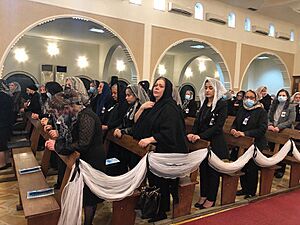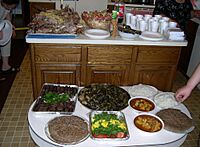Assyrian culture facts for kids
Assyrian culture is a unique culture that is different from other groups in the Assyrian homeland. Many of its special traditions can be traced back thousands of years to ancient Mesopotamia. Many Assyrians still speak, read, and write in dialects of Eastern Aramaic, a language group that has been influenced by the ancient Akkadian language.
A very important part of modern Assyrian culture is Syriac Christianity. Most Assyrians belong to several different Christian churches, including the Ancient Church of the East, the Assyrian Church of the East, the Chaldean Catholic Church, and the Syriac Orthodox Church.
Contents
History
The history of the Assyrian people is very long and rich, starting with the ancient Assyrian Empire. Their culture has survived for thousands of years, even through many difficult times.
Annual Celebrations
Assyrians celebrate many traditions throughout the year. Most of these celebrations are connected to their Christian faith. These include special days for saints, called hareh, and other festivals that have been practiced for over 1,500 years.
Assyrian Martyr's Day

On August 7th, Assyrians remember a very sad event in their history known as the Simele massacre. In August 1933, many Assyrians in northern Iraq lost their lives during a time of great hardship. It is estimated that about 3,000 people died.
To honor the memory of those who were lost, the Assyrian Universal Alliance declared August 7th as Martyrs Day (ܝܘܡܐ ܕܣܗܕ̈ܐ, Yawma d-Sahdhe). It is a national day for Assyrians to mourn and remember.
Resha d-Nisan (Assyrian New Year)

The Assyrian new year festival is called Resha d-Nisan, which means "Head of April." It is celebrated on the first day of spring and the festivities continue for 12 days.
Celebrations include parades and parties. People gather at clubs and community centers to listen to poets tell the "Story of Creation." Men and women wear colorful traditional clothes and dance in parks for hours.
For many years, Assyrians in Turkey were not allowed to celebrate Resha d-Nisan in public. However, since 2006, they have been able to hold public celebrations again.
Kalo d-Sulaqa (Bride of the Ascension)

The celebration of Kalo d-Sulaqa is based on an old legend about bravery. The story tells of a time when the city of Mosul was attacked by the army of Tamerlane. The city's governor, Malik Shalita, and his wife led the defense of their home.
According to the legend, Malik Shalita's wife organized the women of the city. They dressed in white and helped bring food and supplies to the men who were fighting. The men and women showed great courage as they defended their city together. Sadly, both Malik Shalita and his wife are said to have died in the battle.
This tradition honors the memory of the brave young men and women who protected their homeland. To celebrate, girls in a village would choose one person to be the Kalo d-Sulaqa ("the Bride of the Ascension"). She would be dressed in a traditional Assyrian wedding costume and walk through the village, singing and collecting treats like walnuts and raisins.
Today, Assyrian communities around the world still celebrate this day. It is often a party for women and girls, and sometimes they hold a fun mock wedding where young girls dress up as the bride and groom.
Baʿutha d-Ninwaye (Fast of Nineveh)
The Baʿutha d-Ninwaye, which means "Pleading of the Ninevites," is a three-day period of prayer and fasting. It is a sacred tradition for Assyrians in many different churches.
The story behind this fast comes from the Old Testament story of the prophet Jonah. God sent Jonah to the great city of Nineveh to warn the people that their city would be destroyed if they did not repent for their sins. Jonah did not want to go, so he ran away on a ship. A huge storm began, and the sailors threw Jonah overboard. A giant fish then swallowed him whole.
For three days and nights, Jonah was in the fish's stomach, where he prayed to God for forgiveness. The fish then spit Jonah out onto a beach. Jonah finally traveled to Nineveh and warned the people. The king and all the people of Nineveh were sorry for their actions. They fasted and prayed, and God forgave them and saved their city.
To remember this story, Assyrians fast for three days each year, three weeks before the start of Lent.
Life Events and Traditions
Marriage Rituals
Assyrian weddings are typically large, joyful events with many special traditions. These rituals have been passed down for generations and are still practiced today, even by Assyrians living in other countries.
Weddings are not just about the new couple. They are also an important way for the entire community to come together and celebrate their Assyrian identity and culture.
Remembering Loved Ones
When a loved one passes away, Assyrians have special customs to show respect and grief. The mourning family often hosts an "open house" where friends and relatives can visit and offer their condolences.
At the funeral, people gather at the church and then at the cemetery. They burn incense, and the clergy chant hymns in the Syriac language. Female relatives may sing special songs of remembrance called jnana to express their sadness.
After the burial, everyone returns to the church hall for a meal. The family wears black clothing for a period of time to show they are in mourning. They also visit the grave on important days, like 40 days after the funeral and one year later, to continue honoring their loved one.
Assyrian Cuisine
Assyrian food is delicious and is very similar to other Middle Eastern and Caucasian cuisines. Many dishes are like those found in Iraq, Turkey, Iran, and Syria.
The food is rich in grains like barley, meat, tomatoes, herbs, and spices. Assyrians also use a lot of cheese, potatoes, fermented dairy products, and pickles in their cooking.
See also
- Christian culture



